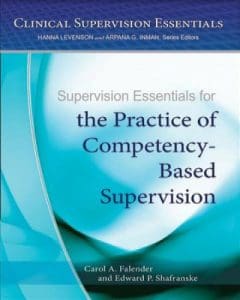Supervision Essentials for the Practice of Competency-Based Supervision 18-Hour CE Bundle
A 6-part Clinical Supervision Series adapted from the book “Supervision Essentials for the Practice of Competency-Based Supervision” by Carol A. Falendar & Edward P. Shrafenske
Supervision is now recognized as a core competency domain for clinical therapists and guidelines have been created to facilitate the provision of competent supervision across professional groups. In this clinical supervision competency training series, we consider major approaches to the supervisory practice to include those that are based on theoretical orientation as well as identifying and discussing key issues that typically need to be addressed in the supervisory relationship.
Each series lesson in this series is approved for 3 hours of Clinical Supervision Specific Training, General Skill Building, and in some lessons, Ethics hour will be indicated.
This CSS course bundle issues ONE certificate for 18 CE hours upon completion of all lessons in this course bundle. This course bundle does NOT issue individual certificates for each completed lesson. Please consider purchasing the individual CSS courses if you need to earn certificates for each completed part of the CSS training series.
Course Instructor: Shannon McCabe, MA, LCAS, CCS, CCJP, CPS
Recording Date: 2/26/2024



